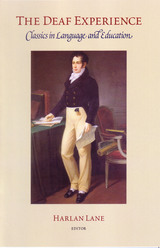
The fifth volume in the Gallaudet Classics in Deaf Studies series features works written from 1764 up to1840. Pierre Desloges offers a stirring paean to sign language in an excerpt from his book, the first ever published by a deaf person. Saboureux de Fontenay and Jean Massieu, two prominent leaders, relate their respective experiences in autobiographical accounts. In separate essays, Charles-Michel de l’Epée and Roch-Ambroise Sicard describe systems for teaching manual French, followed by a critique of these methods by Roch-Ambroise Bébian, a well-known hearing friend of Deaf people during that era. Ferdinand Berthier, a renowned Deaf teacher and writer in the 19th century, concludes with a history of Deaf people up to that time.
The Deaf Experience shows clearly how this extraordinary era of French deaf education influenced the adoption of the manual method by the first schools for deaf students in America, in sharp contrast to the oral movement that repressed sign-language-centered education for nearly a century afterward. Deaf studies scholars and students alike will welcome the return of this invaluable resource.


Ancient Greeks and Romans often turned to magic to achieve personal goals. Magical rites were seen as a route for direct access to the gods, for material gains as well as spiritual satisfaction. In this fascinating survey of magical beliefs and practices from the sixth century B.C.E. through late antiquity, Fritz Graf sheds new light on ancient religion.
Evidence of widespread belief in the efficacy of magic is pervasive: the contemporaries of Plato and Aristotle placed voodoo dolls on graves in order to harm business rivals or attract lovers. The Twelve Tables of Roman Law forbids the magical transference of crops from one field to another. Graves, wells, and springs throughout the Mediterranean have yielded vast numbers of Greek and Latin curse tablets. And ancient literature abounds with scenes of magic, from necromancy to love spells. Graf explores the important types of magic in Greco-Roman antiquity, describing rites and explaining the theory behind them. And he characterizes the ancient magician: his training and initiation, social status, and presumed connections with the divine world. With trenchant analysis of underlying conceptions and vivid account of illustrative cases, Graf gives a full picture of the practice of magic and its implications. He concludes with an evaluation of the relation of magic to religion. Magic in the Ancient World offers an unusual look at ancient Greek and Roman thought and a new understanding of popular recourse to the supernatural.

In this first of four volumes that aim to revitalize the fundamental values of modern political thought, one of the leading figures in the contemporary revival of liberalism in France responds to these critics and offers a philosophically cogent defense of a humanistic modernity. Luc Ferry reexamines the philosopical basis of the contemporary retreat from the Enlightenment and then suggests his own alternative, which defends the ideals of modernity while giving due consideration to the objections of the critics.

Ferry begins this second volume of his ambitious three-volume Political Philosophy by considering both the structure and the potential political effects of the various philosophies of history born of German Idealism. He focuses on the key question of whether, and to what extent, the principle of reason may be said to govern the totality of the historically real. This leads to an examination of Hegel's criticism of the moral view of the world and to an assessment of the phenomenological criticism of Hegel put forth by Heidegger and Arendt.

Several French theorists have recently attempted a new account of rights, one that would replace the discredited Marxist view of rights as mere formalities concealing the realities of class domination. In this final volume of Political Philosophy, Luc Ferry and Alain Renaut summarize these efforts and put forward their own set of arguments.
READERS
Browse our collection.
PUBLISHERS
See BiblioVault's publisher services.
STUDENT SERVICES
Files for college accessibility offices.
UChicago Accessibility Resources
home | accessibility | search | about | contact us
BiblioVault ® 2001 - 2024
The University of Chicago Press









